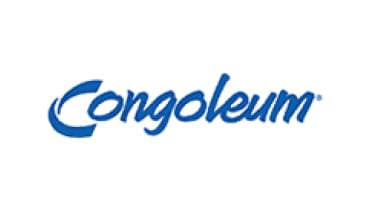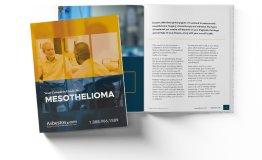Congoleum Corporation
Congoleum Corporation made asbestos flooring materials from the late 1940s until the mid-1980s. The company faced asbestos litigation that forced it into bankruptcy in 2003. In 2010, it established a trust fund with $270 million to handle asbestos claims.

Written by Daniel King | Scientifically Reviewed By Sean Fitzgerald, PG | Edited By Walter Pacheco | Last Update: July 10, 2024
Congoleum’s History with Asbestos
Congoleum Corporation manufactured flooring products with asbestos from 1947 to 1984.
The company used asbestos because it provided heat resistance that made the products less likely to catch fire. Asbestos also added strength and durability to flooring materials.
Congoleum used asbestos in its asphalt tiles, vinyl tiles, sheet flooring and countertop covering. Many of the company’s most popular products contained asbestos, including the “Gold Seal” flooring products that were offered in the 1950s.
These products exposed many workers to asbestos, including Congoleum employees who manufactured them, and the end users who worked with them. Workers who got sick from Congoleum products have sued the company for compensation to cover medical bills and lost wages.
Development of the Congoleum Plan Trust
Mounting asbestos litigation eventually hurt the company’s finances and forced them to file for Chapter 11 bankruptcy in 2003.
In July 2010, a District Court in New Jersey confirmed Congoleum’s bankruptcy reorganization plan, which created the Congoleum Plan Trust to handle future asbestos claims.
A little more than 50% of the company’s stock was put into the trust. An additional $235 million was added to cover the estimated cost of future claims.
The current payment percentage for the trust is 12.5%.
In December 2021, the trustees announced an extension of temporary policy changes in response to the COVID-19 pandemic. For example, the trustees temporarily suspended the requirement to notarize documents and instead requires the signature of one witness.

Gain access to trust funds, grants and other forms of compensation for you or your loved ones.
Get Help NowAsbestos Litigation Involving Congoleum
Prior to filing for bankruptcy, Congoleum was named in thousands of asbestos lawsuits.
Case of Robert Ehret
In one case, floor covering contractor Robert Ehret sued Congoleum and several other flooring manufacturers in the late 1990s. He developed pericardial mesothelioma as a result of the asbestos in the flooring he installed for approximately 30 years. Ehret passed away during the trial, but the jury awarded his wife and heirs $3.3 million dollars for pain, suffering and loss of consortium and earnings.
Case of Asbestos Contamination in New Jersey Factory
Congoleum’s former manufacturing plant in Kearny, New Jersey, was subject of a $19 million lawsuit for asbestos contamination at the site. In August 2018, U.S. District Judge Keven McNulty rejected an argument that the claims are precluded by Congoleum’s settlement of asbestos-related claims in bankruptcy court.
Congoleum’s Asbestos Products & Workers at Risk
Congoleum’s asbestos-containing flooring products include:
- Commercial Vinyl Flooring
- Congoleum Asphalt Tile
- Congoleum Solid Seal Vinyl Inlay
- Cushioned Vinyl
- Cushionflor
- Cushionflor Supreme
- Dynasty
- Fashionflor
- Fashionflor Cushioned Vinyl
- Firechek Vinyl Wall Covering
- Firechek Bulletin Board
- Firechek Bulletin Board Cork
- Flor-Ever
- Flor-Ever Deluxe Vinyl
- Flor-Ever Vinyl Tile
- Flor-Ever Vinyl Countertop
- Gold Seal Tile
- Gold Seal Asphalt Floor Tile
- Gold Seal Nairon Deluxe
- Gold Seal Nairon Standard Countertop
- Gold Seal Vinyl Inlaids
- Gold Seal Vinyl Nairon Standard
- Narin Asphalt Floor Tile
- Supertile
- Sparklewood Tile
- Ultraflor Esteem
- Ultraflor Imperial
- Ultraflor Majestic
- Ultraflor Regal
- Vinylbest Tile
Although Congoleum’s asbestos flooring products may have been labeled, installers were not warned about the dangers of asbestos exposure. Cutting or sanding Congoleum flooring products for residential or commercial installations could result in asbestos exposure that leads to a related disease.
The occupations most at risk of exposure to Congoleum’s asbestos products include:
- Flooring installers
- Tile workers
- Drywall workers
- Construction workers
- Demolition workers
- Maintenance workers
- Interior Designers
Congoleum’s own guide for making repairs to Congoleum floor coverings states that, unless you are positive that the flooring does not contains asbestos, you should assume that it does. Even Congoleum’s felt backing contained asbestos in addition to the flooring material itself.
Congoleum’s History
Congoleum Corporation traces its origins back to 1828 in Scotland when Michael Nairn began making canvas sailcloth. The canvas was sold to makers of “floorcloth,” which was the precursor to linoleum.
In 1886, the Nairn family expanded the business into the U.S. and opened a factory in Kearny, New Jersey.
The company gets its name from a simulated wood grain flooring that it sold until the 1930s. Asphalt materials from the Belgian Congo, now the Democratic Republic of Congo, were used to make the product and inspired the name Congoleum.
The Nairns manufactured linoleum flooring under the name Nairn Linoleum until it partnered with a supplier from the Belgian Congo. Nairn Linoleum became Congoleum-Nairn and began manufacturing vinyl flooring in the 1950s. Congoleum was also the first company to offer “no-wax” resilient flooring.
In the 1960s the company changed its name to Congoleum Corporation and continued to expand. From 1993 to 2012, the company was partially owned by American Biltrite Inc. Congoleum went public in 1995 but became private again after filing for bankruptcy in 2010. It remained a private company when it broke ties with American Biltrite.
Most recently, Congoleum partnered with 3M Corporation in 2004 to offer new resilient flooring with Scotchgard Protector. Congoleum continues to develop new flooring products that are found in retail stores across the nation. All products are manufactured in Pennsylvania, Maryland and New Jersey.
This Page Contains 7 Cited Articles
The sources on all content featured in The Mesothelioma Center at Asbestos.com include medical and scientific studies, peer-reviewed studies and other research documents from reputable organizations.
- Congoleum Plan Trust. (2021, December 17). COVID-19 Pandemic Notice. Retrieved from http://www.congoleumtrust.com/assets/documents/Congoleum-Notice-12-17-2021.pdf
- Toutant, C. (2018, August 27). Environmental Case Over Kearny Site Moves Ahead Despite Prior Settlement of Asbestos Claims. Retrieved from https://www.law.com/njlawjournal/2018/08/27/environmental-case-over-kearny-site-moves-ahead-despite-prior-settlement-of-asbestos-claims/
- Congoleum Plan Trust. (2018). Congoleum Plan Trust Home. Retrieved from http://www.congoleumtrust.com/
- Gallagher, M.P. (2010, July 21). Approved Congoleum bankruptcy plan puts all asbestos claims in same boat. Retrieved from https://www.law.com/almID/1202463755825/
- Rand. (2010). Asbestos Bankruptcy Trusts: An Overview of Trust Structure and Activity with Detailed Reports on the Largest Trusts. Retrieved from https://www.rand.org/content/dam/rand/pubs/technical_reports/2010/RAND_TR872.pdf
- Ehret v. Congoleum Corporation. (2001). Retrieved from http://caselaw.findlaw.com/ca-court-of-appeal/1464857.html
- Congoleum. (n.d.). History. Retrieved from https://www.congoleum.com/history/







